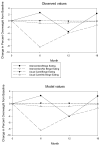Self-reported binge eating in severe pediatric obesity: impact on weight change in a randomized controlled trial of family-based treatment
- PMID: 20157322
- PMCID: PMC2891360
- DOI: 10.1038/ijo.2010.35
Self-reported binge eating in severe pediatric obesity: impact on weight change in a randomized controlled trial of family-based treatment
Abstract
Objective: This study sought to document self-reported binge eating in a large sample of severely obese children and to examine the impact of binge eating on changes in percent overweight among children randomized to family-based behavioral treatment (intervention) versus control (usual care).
Participants and methods: As part of a larger randomized controlled trial, 192 children aged 8-12 years (M=10.2, s.d.=1.2) with a mean body mass index (BMI) percentile of 99.2 (s.d.=0.7) completed assessments at baseline and 6-, 12-, and 18 months post-randomization. A parent or guardian also participated. Child psychological symptoms, including binge eating, were measured before randomization using self-report questionnaires. Child height and weight were measured at baseline, 6-, 12-, and 18 months. The primary study outcome was percent overweight (that is, percent over median BMI for age and sex).
Results: Twenty-two children (11.5%) endorsed binge eating at baseline (Binge Eating Group). Children in the Binge Eating Group were younger and had more depressive, anxiety, and eating disorder symptoms, and lower self-esteem than children in the rest of the sample (No Binge Eating Group). There also were differences between the Binge Eating and No Binge Eating groups with respect to the short-term effects of treatment group assignment on change in percent overweight during the study. Specifically, improvements in percent overweight in the intervention condition relative to usual care were documented in the No Binge Eating Group only. Among children in the Binge Eating Group, those assigned to intervention showed a 2.6% increase in percent overweight, on average, at the completion of acute treatment as compared to an 8.5% decrease among children without binge eating. However, these effects were not maintained during follow-up.
Conclusion: Results of this study suggest the importance of considering binge eating in the development of weight management programs for severely obese youth.
Conflict of interest statement
Conflict of Interest: The authors declare no conflict of interest.
Figures
References
-
- Decaluwe V, Braet C. Prevalence of binge-eating disorder in obese children and adolescents seeking weight-loss treatment. Int J Obes Relat Metab Disord. 2003;27:404–409. - PubMed
-
- Decaluwe V, Braet C, Fairburn CG. Binge eating in obese children and adolescents. Int J Eat Disord. 2003;33:78–84. - PubMed
Publication types
MeSH terms
Grants and funding
LinkOut - more resources
Full Text Sources
Medical
Research Materials


